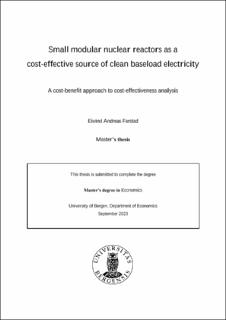Small modular nuclear reactors as a cost-effective source of clean baseload electricity
Master thesis
Permanent lenke
https://hdl.handle.net/11250/3088987Utgivelsesdato
2023-09-02Metadata
Vis full innførselSamlinger
- Master theses [118]
Sammendrag
The world needs stable and sustainable, low-carbon energy sources to address the pressing challenges of climate change and energy security. Unlike non-renewable sources of electricity, many renewable sources are intermittent. This intermittency poses a challenge in ensuring a reliable and steady supply of electricity to meet the baseload demand. Nuclear energy offers the advantage of being virtually carbon-free and capable of providing a consistent power output, to meet baseload demand. Small modular nuclear reactors also known as SMRs, present potential improvements over traditional large-scale nuclear reactors, making SMRs a potentially feasible contributing solution to the security of supply issue posed by renewables. On this basis my thesis proposes the question: Can small modular nuclear reactors be a cost-effective solution to the security of supply issue in achieving carbon-neutral power grids? Through using a cost-benefit analysis framework for financial net present value estimation while exploring the relevant economic literature, I model the financial returns of small modular nuclear reactors, SMRs, and large-scale reactors. I proceed to use the financial estimates from the cost-benefit analysis framework to model the cost-effectiveness measures of SMRs and large-scale reactors, and perform cost-effectiveness analysis comparing SMRs to large-scale reactors and an all-renewable battery-based solution for benchmarking. My results imply the needed retail market electricity price for the return on the nuclear power plant to be worthwhile for investors, ranges between $147 and $213 per MWh, for SMRs. Meanwhile, that of the large-scale reactors ranges between $101 and $2806 per MWh, and combining lead-acid batteries with intermittent wind and solar under ideal conditions, might require a retail electricity price of $575 per MWh. As I estimate the historical real average retail price for electricity over the last few years to be $140, it seems that neither SMRs nor large-scale reactors are competitive in wholesale electricity markets without policy intervention. However, my results suggest SMRs require a lower retail price of electricity for the investment to be attractive, compared to large-scale reactors and the benchmarking alternative. This led to the conclusion that small modular nuclear reactors can be a cost-effective solution to the security of supply issue in achieving carbon-neutral power grids. I recommend that policy intervention should be used to incentivize investments in SMRs and other carbon-neutral solutions, as long as the financial and social costs of these interventions are lower than the benefit of achieving carbon-neutral power grids.
